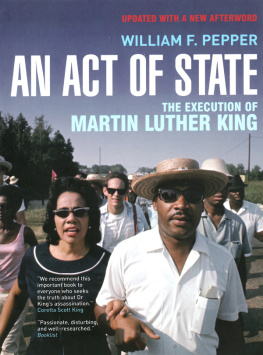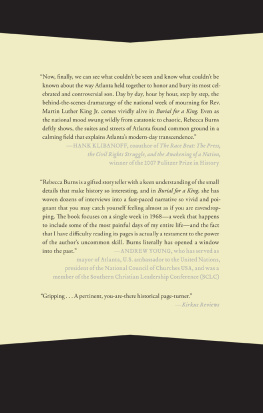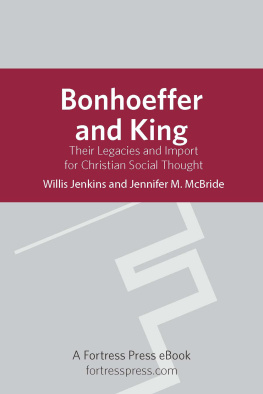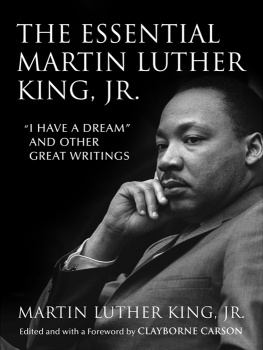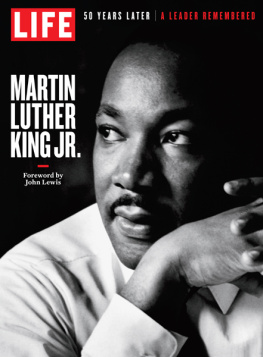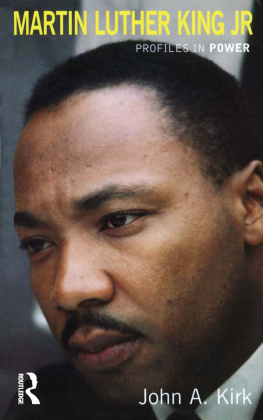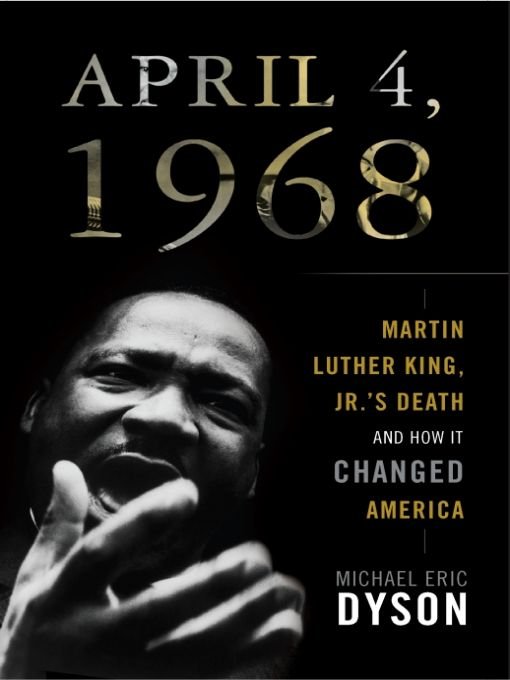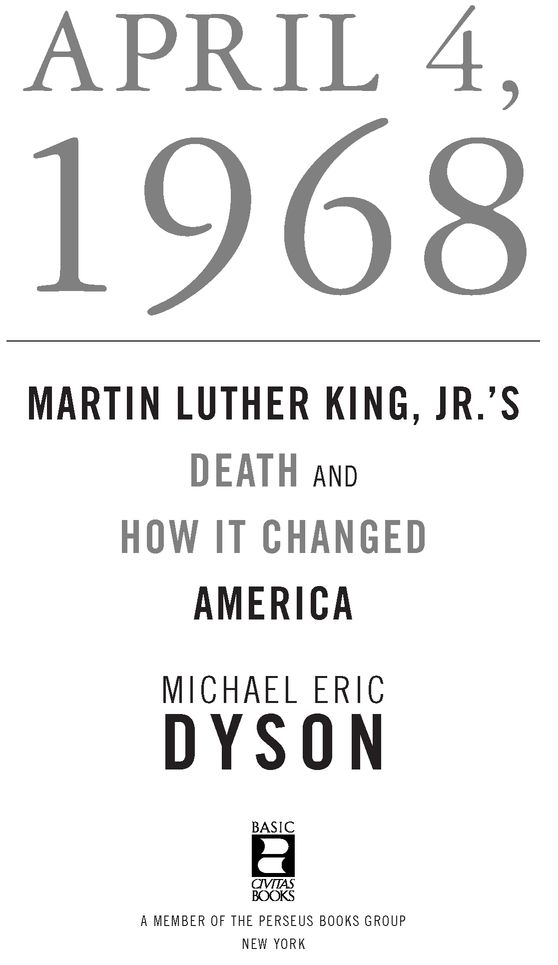Table of Contents
ALSO BY MICHAEL ERIC DYSON
Know What I Mean? Reflections on Hip Hop (2007)
Debating Race (2007)
Pride: The Seven Deadly Sins (2006)
Come Hell or High Water:
Hurricane Katrina and the Color of Disaster (2006)
Is Bill Cosby Right?
Or Has the Black Middle Class Lost Its Mind? (2005)
Mercy, Mercy Me:
The Art, Loves, and Demons of Marvin Gaye (2004)
The Michael Eric Dyson Reader (2004)
Why I Love Black Women (2003)
Open Mike:
Reflections on Philosophy, Race, Sex, Culture, and Religion (2003)
Holler If You Hear Me: Searching for Tupac Shakur (2001)
I May Not Get There with You:
The True Martin Luther King, Jr. (2000)
Race Rules: Navigating the Color Line (1996)
Between God and Gangsta Rap:
Bearing Witness to Black Culture (1996)
Making Malcolm: The Myth and Meaning of Malcolm X (1995)
Reflecting Black: African-American Cultural Criticism (1993)
TO
MS. OPRAH WINFREY
THE FULFILLMENT OF THE DREAM
WHO LOOKS OUT ON THE PROMISED LAND HE MADE POSSIBLE
PREFACE
When Martin Luther King, Jr., was murdered, I was a nine-year-old schoolboy. I had no idea who he was, had never heard his name or seen him in action. Just as technology had allowed him to speak at his own funeral, it offered me my first glimpse of Kings oratorical magic. Like so many folk born after he died, I first met King on television. I was sitting on the living room floor of my inner city Detroit home. Martin Luther King, Jr., has just been shot in Memphis, Tennessee, the newsman announced, interrupting whatever program we were watching. My father sat behind me in his favorite chair. He was barely able to utter humph. It was one of those compressed sighs that held back far more pain than it let loose. It came from deep inside his body, an involuntary reflex like somebody had punched him in the gut.
The newsman reported that King had been seriously wounded on a hotel balcony. Then we were ushered by film into Mason Temple for the climax of Kings soul shaking last speech. When he finished, I was stunnedthat words could thrill me that way, that they could cause such delicious pandemonium in an audience. Kings electrifying rhetoric stood the hair on my arms at attention. Soon the newsman broke faith once more with the scheduled programming to announce the final tragedy.
Martin Luther King, Jr., has been assassinated in Memphis, Tennessee, at thirty-nine years old.
After Kings death, I hungered to know him. I haunted libraries in search of biographies, sent off for recordings of his speeches, talked to teachers about his life. I learned that he was a man of peace and love. I also got scared: if King could be murdered for seeking to heal the nations racial fractures, then all black men might be vulnerable. I thought to myself: If they killed him, and he didnt want to harm anybody, then they could kill me too. For more than a year, I couldnt stand in front of the upstairs bathroom sink because a door with a window opened onto a small balcony. I feared that I, too, might be taken out. The bullet that shattered Kings jaw lodged fragments of fear deep inside my psyche.
April 4, 1968 is my effort to grapple with Kings deathin my own mind, and in the life of the nation. My earlier book on the leader wrestled with his radical legacy and the way it had been hijacked by conservatives out to remake King into an opponent of both affirmative action and a culture that usefully takes race into account. The present study aims to understand just how dominant death was in Kings lifehow he fought death and faced it down all the same, even as he used death to rally his people in the fight for justice. By probing how King embraced deaths inevitability to shape his social agenda, we may better understand how he secured his legacy on the bloody battlefields of racial transformation.
If King was his peoples Moses, their charismatic and bold leader, then his vision of the Promised Land has influenced how later generations of black folk have measured their distance from the achievements he foresaw. It has been 40 years since King gave his last will and testament in Memphis and encouraged his followers to believe that he had seen the future promise of fulfillment. Are we any closer to Kings beloved community, or are we wandering in a vast racial wilderness from which there is no easy escape? If the signs of arrival into the land of milk and honey are strongest for the wealthiest among us, they are depressing and weak for the poorest. Our faltering quest for justice for the lowliest members of our community suggests the responsibility of the most gifted to forge a path on their behalf. This, after all, is how King spent his last days, fighting for the rights and increased wages of striking sanitation workers. And what of the Joshuas left standing to lead their people into the Promised Land? Has charismatic leadership run its course, or do Messianic leaders still have a role to play in our national destiny? Jesse Jackson, Al Sharpton and Barack Obama all in varying ways can claim aspects of Kings black Christian leadership mantle. But have they measured up to Kings own vision of how those who would come after him must respond to the crises at hand?
On the 40th anniversary of Martin Luther King, Jr.s death, it is sobering to realize that he will have been dead longer than he lived. And yet his deeply moving moral vision has lasted beyond the grave. Kings painful but productive martyrdom rescued both his failing reputation as a great leader and the efforts of black folk to move further along the path to racial redemption and national thriving. But now that King is enshrined in a national holiday, his challenge to the status quoand thus his ability as a symbol to inspire radical social changeis smothered beneath banalities and platitudes.
Only by turning to his death and martyrdom can we size up the work that remains to be done and address the suffering and hardship that too many of the folk he loved continue to face. If January 15, 1929, is a holiday celebration trumpeting the arrival of the prophet, then April 4, 1968, is a day that directly confronts the sorrows and death we must forever negotiate. Kings memory continues to call us forward out of our creature comforts into the sacrifices of body and spirit that he routinely made. If we hear again his voice, and listen once more to his enduring faith, even as he confronts death, we just might successfully conquer the death and grief in our own souls and in our nation. And we might just resurrect the hope we need to inch even closer to the Promised Land he saw.
Well I dont know what will happen now. Weve got some difficult days ahead. But it really doesnt matter with me now. Because Ive been to the mountaintop. And I dont mind. Like anybody, I would like to live a long life. Longevity has its place. But Im not concerned about that now. I just want to do Gods will. And Hes allowed me to go up to the mountain. And Ive looked over. And Ive seen the Promised Land. I may not get there with you. But I want you to know tonight, that we as a people will get to the Promised Land. And so Im happy tonight. Im not worried about anything. Im not fearing any man. Mine eyes have seen the glory of the coming of the Lord.



